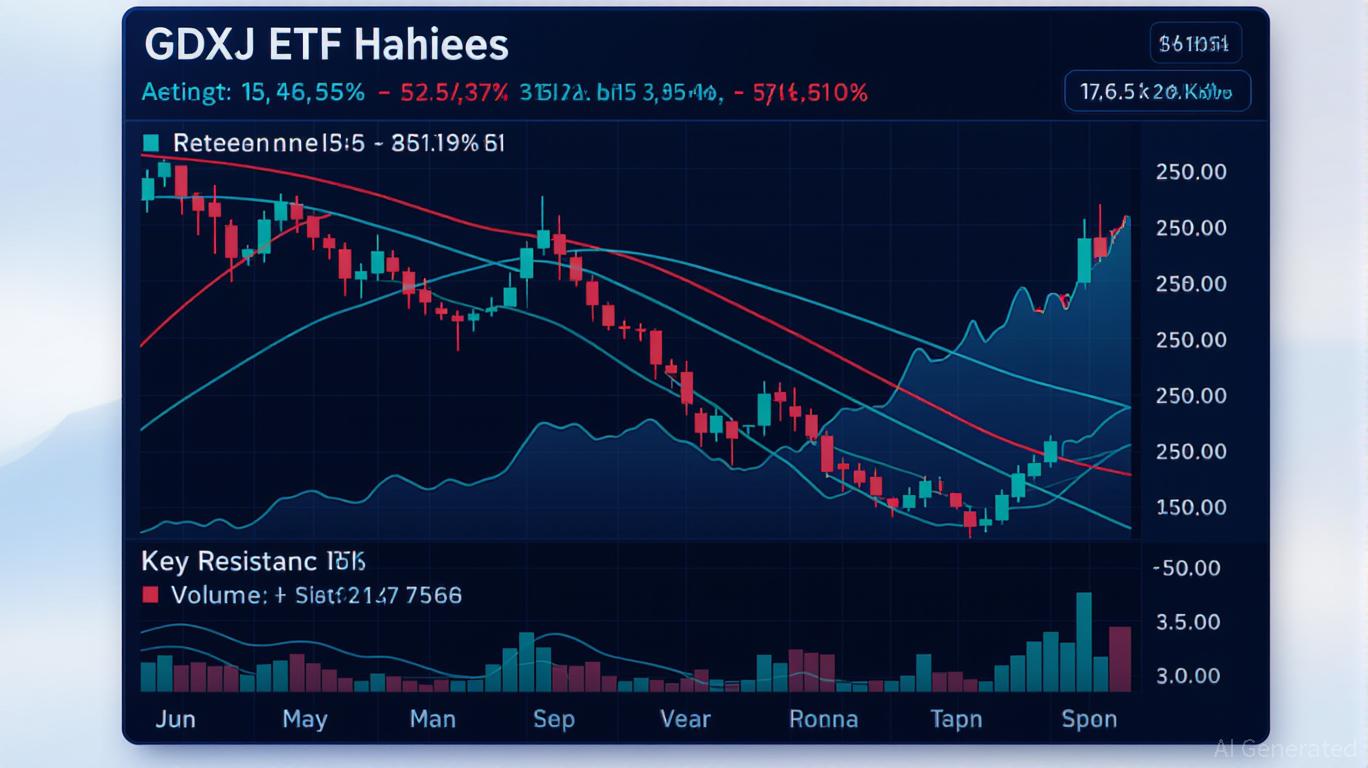Solana News Update: Investors Shift Toward XRP ETFs, Bringing Solana's 21-Day Inflow Streak to a Close
- Solana ETFs ended a 21-day inflow streak with a $8.1M net outflow on Nov 27, 2025, led by 21Shares TSOL's $34.37M redemptions. - This reversal contrasted with Bitcoin/Ethereum ETFs' $5.43B outflows and highlighted Solana's 7% staking yields and 70M daily transactions. - Analysts linked the shift to profit-taking, macroeconomic pressures, and investor rotation toward XRP ETFs with perfect inflow records. - Despite the outflow, Solana ETFs still hold $964M in assets, but face challenges as TVL dropped 32%
Solana ETF Inflow Streak Ends Amid Market Turbulence
Solana (SOL) exchange-traded funds, once a beacon of institutional optimism for the blockchain, saw their impressive streak of daily inflows come to a halt on November 27, 2025. On that day, Solana ETFs experienced their first net outflow, totaling $8.1 million, after 21 consecutive sessions of positive inflows. This reversal was largely attributed to the 21Shares Solana ETF (TSOL), which faced $34.37 million in redemptions, pushing the sector into negative territory. Despite this setback, other Solana ETFs, such as Bitwise's BSOL and Grayscale's GSOL, continued to attract investor capital, helping to cushion the overall outflow.
The abrupt end to Solana's inflow streak highlights the increasing volatility within the crypto ETF sector. Since their inception, Solana ETFs had managed to defy broader market declines, amassing $568 million in net inflows. However, the recent outflow has exposed the fragility of investor confidence. The TSOL fund, now holding $86 million in net assets after cumulative outflows of $26 million, became the focal point of this shift. Experts point to a mix of profit-taking, macroeconomic uncertainty, and a rotation of funds toward other assets—such as XRP ETFs, which have maintained a flawless inflow record since launching on November 14—as key drivers behind the change.

Solana ETFs have outperformed their Bitcoin and Ethereum counterparts, which have struggled in recent months. In November alone, Bitcoin ETFs saw $3.79 billion in outflows, while Ethereum ETFs lost $1.64 billion. In contrast, Solana funds attracted $414 million during the same period. This resilience was supported by competitive fees, staking yields reaching up to 7%, and strong institutional interest in Solana's high transaction throughput—reportedly processing 70 million transactions daily. Nevertheless, the latest outflow suggests that even robust fundamentals may not fully insulate Solana from broader market anxieties.
Investors are now closely monitoring the situation for signs of stabilization. Despite the $8.1 million outflow, Solana ETFs still manage $964 million in assets, representing 1.15% of the blockchain's $79 billion market capitalization. Meanwhile, XRP ETFs have surged, accumulating $643 million in inflows without a single day of net outflows. In contrast, Dogecoin ETFs have underperformed, with Grayscale's GDOG ETF recording only $1.4 million in trading volume on its first day.
The contrasting performances among crypto ETFs reflect shifting institutional preferences. While Solana's total value locked has dropped by 32% since September, indicating some bearish sentiment, continued ETF inflows suggest ongoing faith in the blockchain's long-term potential. As markets contend with uncertainty around Federal Reserve policy and rising interest rates, the coming weeks will reveal whether Solana's institutional support can persist or if the recent outflow marks the start of a broader reassessment of risk. For now, the story of Solana ETFs encapsulates the ongoing tension between innovation and volatility in the cryptocurrency sector.
Disclaimer: The content of this article solely reflects the author's opinion and does not represent the platform in any capacity. This article is not intended to serve as a reference for making investment decisions.
You may also like
COAI Experiences Steep Price Drop: Opportunity for Contrarian Investors or Red Flag for Junior Gold Mining Stocks?
- COAI refers to both ChainOpera AI and junior gold miners' index, with this analysis focusing on the latter's market dynamics. - Junior gold miners (GDXJ ETF) fell 27% in six months amid dollar strength, inflation fears, and overbought conditions after a 128.8% rally. - Technical indicators show bearish signals: broken trend channels, negative volume balance, and RSI divergence, though long-term bull trends persist. - GDXJ's 163.9% surge outpaced gold bullion gains, creating valuation gaps, while ChainOpe

Silver Soars Amid Ideal Conditions of Policy Shifts and Tightening Supply
- Silver surged to $52.37/oz as Fed rate cut expectations (80% probability) and falling U.S. Treasury yields boosted demand for non-yielding assets. - China's record 660-ton silver exports and 2015-low Shanghai warehouse inventories intensified global supply constraints, pushing the market into backwardation. - Geopolitical risks (Ukraine war) and potential U.S. silver tariffs added volatility, while improved U.S.-China relations eased short-term trade concerns. - Prices face critical $52.50 resistance; Fe
XRP News Today: As XRP Declines, Retail Investors Turn to GeeFi's Practical Uses
- GeeFi's presale hits 80% of Phase 1 goal with $350K raised, targeting 3,900% price growth as XRP declines 20% monthly. - GEE's utility-driven features like crypto cards, multi-chain support, and 55% staking returns contrast with XRP's institutional dependency and shrinking retail base. - Deflationary tokenomics and 5% referral bonuses drive FOMO, positioning GeeFi as a 2026 crypto disruptor amid XRP's regulatory and adoption challenges.

Sloppy implementation derails MegaETH's billion-dollar stablecoin aspirations
- MegaETH abandoned its $1B USDm stablecoin pre-deposit plan after technical failures disrupted the launch, freezing deposits at $500M and issuing refunds. - A misconfigured Safe multisig transaction allowed early deposits, causing $400M inflows before the team scrapped the target, citing "sloppy execution" and operational misalignment. - Critics highlighted governance flaws, uneven access (79 wallets >$1M vs. 2,643 <$5K deposits), and 259 duplicate addresses, raising concerns about transparency and bot ac
